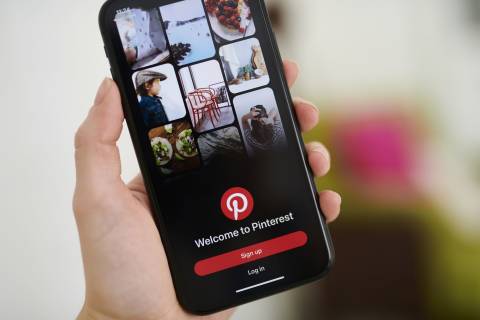(Bloomberg) -- Pinterest Inc. jumped after reporting resilient sales in the face of concerns the uncertain economy would curb digital advertising and user numbers that were better than analysts’ estimates. Shares gained about 20% in extended trading.

Sales increased 9% to $665.9 million in the second quarter, the San Francisco-based company said Monday in a statement. The revenue was in line with the analysts’ average estimate, according to data compiled by Bloomberg. Sales will increase in the “mid-single digits” in the period ending in September, compared with the average estimate of 13% growth.

The company said it had 433 million monthly active users at the end of the period on June 30, about the same as in the previous quarter, but a 5% decline from a year earlier. Still, the numbers were greater than analysts projected. The site gained users during the early part of the pandemic as people stayed home but has had trouble retaining that growth.
Pinterest is a search-and-discovery platform that lets users create digital boards on travel, beauty, recipes and more. The company has worked in recent years to build a bigger e-commerce business to help advertisers and retailers sell products directly on the site. Co-founder Ben Silbermann stepped down as chief executive officer June 28, and was replaced by Bill Ready, whose experience at Alphabet Inc.’s Google and PayPal Inc. will help Pinterest pursue the online sales effort.
Pinterest increased to a high of $23.79 in extended trading after closing at $19.99 in New York. The stock is down 45% this year, despite a 16% single-day jump on July 15 after the Wall Street Journal reported that activist investor Elliott Investment Management had taken more than a 9% stake in the company, which would make it the largest shareholder.
Elliott confirmed its stake Monday in a statement, saying “Pinterest is a highly strategic business with significant potential for growth, and our conviction in the value-creation opportunity at Pinterest today has led us to become the Company’s largest investor.” The investor backed Ready as “the right leader to oversee Pinterest’s next phase of growth.”
The company attributed the drop in active users to lower online traffic from a change to Google’s search algorithm, competition in the US and Canada from other “video-centric” websites and “the lingering impact from the pandemic unwind, particularly outside the US.”
“We’re trying to make the shopping experience on the platform a better, more natural shopping journey with a rich array of products, surfacing the best ideas for our users that match their aesthetic taste and their preferences,” Chief Financial Officer Todd Morgenfeld said in an interview. “And we’re building an even more personalized experience in the product to make sure that when you come to Pinterest it feels like it was designed for you, your interests and your intent. That took a heavy investment in machine learning and core engineering to deliver.”
Pinterest reported a net loss of $43.1 million, or a loss of 7 cents a share, compared with a profit of $69.4 million, or 10 cents, in the quarter a year earlier.
More stories like this are available on bloomberg.com
©2022 Bloomberg L.P.
Author: Elizabeth Moore
